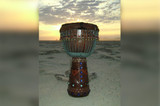Riq vs. Tambourine
What are the differences between a Riq and a tambourine? They tend to resemble each other and seem to be played in a similar style, however there are subtle differences that make each one unique.
The riq (also spelled riqq or rik) is a type of tambourine used as a traditional instrument in Arabic music. It traditionally has a wooden frame (although in the modern era it may also be made of metal), jingles, and a thin, translucent head made of fish skin (or, more recently, a synthetic material). The frame of the riq can be covered on both the inner and outer sides with inlay such as mother-of-pearl, ivory or decorative wood, like apricot or lemon. It has ten pairs of small cymbals (about 4 cm in diameter), mounted in five pairs of slits. The skin of a fish is glued on and tightened over the frame, which is about 6 cm deep. In Egypt the riq is usually 20 cm wide; in Iraq it is slightly larger. The player of the riq plays without singing. The player alternates between striking the membrane and shaking the jingles, as the need for freedom of movement necessitates that they stand up. Students of the instrument are required to master the technical problems imposed by the timbre of the membrane and the jingles, both separately and in combination; aside from developing a virtuoso technique they also need to learn the many rhythmic cycles and the techniques of modifying them through creative invention.
The tambourine is a musical instrument of the percussion family consisting of a single drumhead mounted on a ring with pairs of small metal jingles. Most modern tambourines used in western popular music today consist only of the ring and jingles, with no drumhead. The tambourine can be held in the hand or mounted on a stand, and can be played in numerous ways, from stroking or shaking the jingles to striking it sharply with hand or stick or using the tambourine to strike the leg or hip. It is found in many forms of music, classic music, Roman music, Persian music, gospel music, pop music and rock music.
Recent Posts
-
What is the Best Size Djembe for Beginners?
If you're new to the world of percussion and interested in learning the djembe, you're in for a t …16th Jul 2024 -
The Benefits of Becoming a Drumming Teacher: Transforming Passion into Profession
Why become a drumming teacher? Becoming a drumming teacher is an excellent way to share your pas …22nd May 2024 -
What Makes the Djembe Drum a Spiritual Instrument in African Music?
Origin and history of the Djembe drum The Djembe drum originates from West Africa and holds sign …16th May 2024



